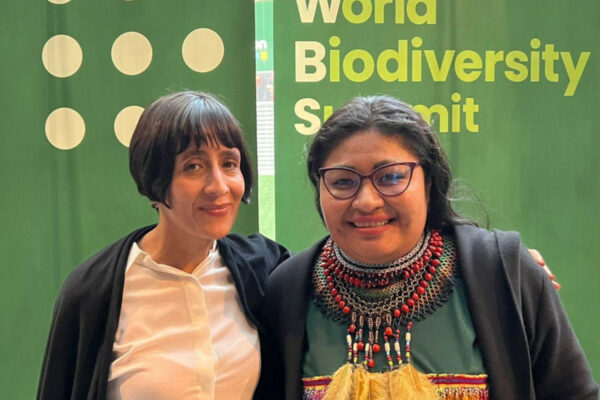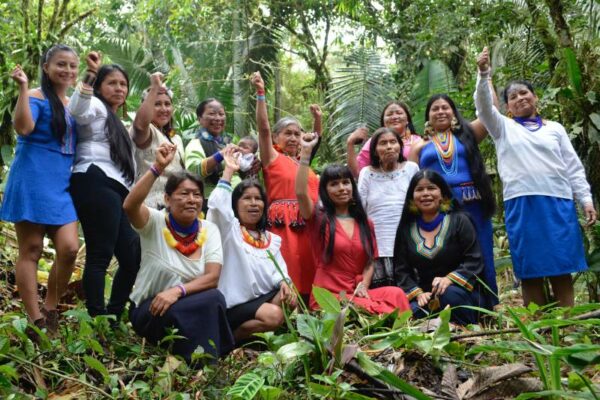Communities from six countries in Latin American and the Caribbean were recognized for their outstanding conservation work in an award ceremony hosted in Paris last Monday 7 December.
Eight communities from the region were among 21 international groups to receive the Equator Prize 2015 – an international award honoring the exceptional achievement of local communities in the area of sustainable development and conservation.
The prize was awarded by the Equator Initiative, which aims to bring together NGOs, civil society and grassroots organizations, governments, the United Nations, and businesses in order to acknowledge and support local sustainability initiatives.
The Equator Initiative, which received an unprecedented 1,461 nominations from 126 countries for the prize, announced the winners in September. The eight communities from the region to claim the award, which included $10,000, were from Brazil, Bolivia, Belize, Honduras, Colombia, and Guyana.
The Munduruku of Brazil
Among those honoured in Monday’s ceremony were the Munduruku from Brazil.
In the depths of the Amazon, this indigenous group of some 13,000 people have diligently fought to protect their land and the Tapajós River from destructive dam development.
According to lore, the god Karosakaybu, who was the first member of their tribe, created the Munduruku, the animals, and the river. For the Munduruku, the river is life itself. To lose it would be devastating.
A series of dams planned for development would destroy the river, as well as submerge vast tracts of Munduruku land.
In response to the proposed dams, the Munduruku formed a resistance movement, Ipereg Ayu. Set up to protect the communities’ land rights and the rainforest from destruction, the movement has enabled the Munduruku to demarcate their ancestral land, protecting it from illegal logging and mining.
“Our struggle is large and dangerous, but we know we shall win. I’ve been to Belo Monte so I know what these dams represent: if they are built on the Tapajós they will flood our lands, and destroy our fish and hunting. We’ve come to put an end to this madness,” Munduruku Chief Suberanino Saw told Amazon Watch in 2104.
Although indigenous land should have been returned to native communities by 1993 according to Brazil’s constitution, the government has failed to so far complete this process.
The Munduruku, in an unprecedented move, took it upon themselves to demarcate their own land in a bid to protect it, after the government failed to do so. In December 2014, they annexed the 178,000-hectare of Sawré Muybu territory. This has strengthened their resistance against the dam proposals.
“The focus on territorial defense and resistance to destructive projects has not only empowered a broad segment of the Munduruku’s 13,000 people, but also encouraged greater organization among the region’s communities to stand as one against common threats and in favour of sustainable, culturally appropriate development,” the Equator Initiative says on its website.
Colombia’s Inga people
Across the border, in Colombia, the Inga people of Aponte have also been awarded the prize for battling to regain areas of their traditional territory amidst the country’s brutal armed conflict.
The Yunguillo Indigenous Reserve is home to the Inga’s sacred sites and threatened species, but between the mid-1980s and 2004, their land was taken over by armed guerrillas, paramilitaries and other criminal groups such as drug traffickers.
The Inga have been struggling since the early 1980s to expand their territory and this year their two-decade long struggle ended and their hard paid off when their Yunguillo Indigenous Reserve was extended from 10,675 to 55,341 acres.
“We consider Mother Earth to be both the reason for our existence and our reason for surviving. To use the land and its resources properly and respectfully, we observe the traditions passed down over generations. We maintain our identity by maintaining these traditions, while adapting to new conditions in order to protect our territory. We do not believe that identity is possible without territory or that we can protect these lands without a strong sense of collective identity,” Nydia Becerra Jacanamejoy, the governor of Yunguillo, told the U.S.-based non-profit organisation Amazon Conservation Team.
The other winners from the region recognised for their work ensuring lands, contributing to conservation, and protecting the environment were the Kayapó from Brazil; Maya from Belize; the Indigenous Council of the Tacana People – (Consejo Indígena del Pueblo Tacana collective) – from Bolivia; and two organisations from Honduras, the Committee for the Defense and Development of Flora and Fauna in the Golf of Fonseca – (Comité para la Defensa y Desarollo de la Flora y Fauna del Golfo de Fonseca) (CODDEFFAGOLF) – and an indigenous federation which represents the Miskito people.
“These winners show what is possible when indigenous peoples and local communities are backed by rights to manage their lands, territories and natural resources,” said Helen Clark, Administrator of the UN Development Programme (UNDP) in a press statement.
“Forests and wildlife are protected, landscapes are managed to provide for food and water security, jobs are created and local people are empowered,” she added. “The bottom line is that land rights for indigenous people are good for the climate, good for sustainable development.”













